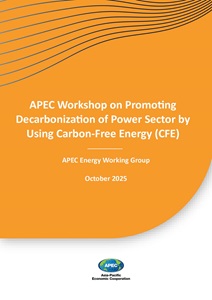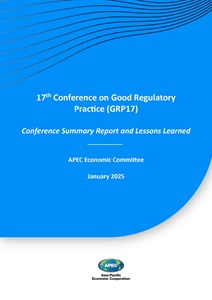
Proceedings
APEC Workshop on Promoting Decarbonization of Power Sector by Using Carbon-Free Energy (CFE)
The Asia-Pacific Economic Cooperation (APEC) is a regional economic forum established in 1989 to leverage the growing interdependence of the Asia-Pacific.
The Asia-Pacific Economic Cooperation (APEC) is a regional economic forum established in 1989 to leverage the growing interdependence of the Asia-Pacific.
APEC ensures that goods, services, investment and people move easily across borders. Members facilitate this trade through faster customs procedures at borders; more favorable business climates behind the border; and aligning regulations and standards across the region.
APEC ensures that goods, services, investment and people move easily across borders. Members facilitate this trade through faster customs procedures at borders; more favorable business climates behind the border; and aligning regulations and standards across the region.
APEC works to help all residents of the Asia-Pacific participate in the growing economy.
APEC works to help all residents of the Asia-Pacific participate in the growing economy.
Capacity building projects play an important role in helping translate APEC's goals into reality.
Capacity building projects play an important role in helping translate APEC's goals into reality.

Proceedings
•January 2025
Download Report
926KB
Published Under
Economic Committee (EC)
Accessed
886
Pages
24
This report outlines the discussions from the 17th Conference on Good Regulatory Practice (GRP) held in Lima, Peru from 19 to 20 August 2024. The Conference gathered experts and participants from the governments, international organizations, academia and business sector to discuss, as a main objective, how core GRPs are fundamental in designing and implementing policies that promote the transition from informal to the formal economy.
The specific objectives of this conference are: i) Share experiences among APEC members on the role of regulatory quality to promote competition and productivity, encouraging the transition to the formal economy; ii) Promote greater reliance on GRPs to enhance regulatory governance and improve the regulatory lifecycle; and iii) Increase capacity among regulatory officials in the implementation of GRPs to respond to emerging regulatory challenges.

